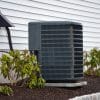If you are looking to install a new HVAC system for your home, you may have come across the term “high-efficiency”.
But what is it, and should you invest in a high-efficiency HVAC system?
In short, high-efficiency HVAC systems are worth it since they can help you save money, reduce emissions, and even improve air quality in the long run. However, they usually have higher upfront costs and may not suit every home ductwork system.
In this article, we will explain what high-efficiency HVAC is and whether you should invest in one. We’ll also dive into the detail of how it works.
Let’s begin!

What Is High-Efficiency HVAC?
High-efficiency HVAC are systems that use less energy but produce better or the same level of conditioned air compared to a standard efficiency system.
They have higher ratings of energy efficiency than standard systems, which means they can save you money and reduce your environmental impact in the long run.
There are different rating metrics you can use to determine the efficiency of an HVAC system, which usually includes a furnace/heat pump and a central air conditioner.
The energy efficiency of ACs
Air conditioners are rated by their SEER (Seasonal Energy Efficiency Ratio), which indicates how much cooling output they provide per unit of electricity consumed. The higher the SEER, the more efficient the air conditioner is. The minimum SEER rating for new air conditioners in Canada is 13, but high-efficiency models can have SEER ratings of 20 or higher.
The energy efficiency of Furnaces
Furnaces are rated by their AFUE (Annual Fuel Utilization Efficiency), which indicates how much heat they deliver per unit of fuel consumed. The lower the AFUE, the less efficient the furnace is. High-efficiency models can have AFUE ratings of 95% or higher. Note that in Canada, the minimum rating is 90% for all new furnaces sold.
The energy efficiency of Heat Pumps
Heat pumps are alternatives to furnaces, they are rated by their HSPF (Heating Seasonal Performance Factor). It’s the same as ACs and furnaces, which means the higher, the better. The lowest rating for heat pumps is around 7.1, and the highly efficient ones should have ratings around 10 and above.

How Does High-Efficiency HVAC Work?
High-efficiency HVAC systems use advanced technology and design to reduce energy consumption and improve performance. Some of the features that make high-efficiency HVAC systems more efficient than standard ones include:
- Variable-speed compressors and fans adjust the cooling and heating capacity according to the demand, making them more responsive and consistent than single-speed or two-speed models.
- Dual-stage or modulating burners regulate the amount of fuel burned according to the heating load, making them more precise and flexible than single-stage models.
- Heat recovery ventilators or energy recovery ventilators (HRvs and ERVs) exchange heat and moisture between the incoming and outgoing air streams, making them more balanced and comfortable than standard ventilation systems.
- Smart thermostats allow you to control and monitor your HVAC system remotely, making them more convenient and adaptable than manual thermostats.
What Are the Pros and Cons of High-Efficiency HVAC?
High-efficiency HVAC systems have many benefits, but they also have some drawbacks that you should consider before buying one. Here are some of the pros and cons of high-efficiency HVAC:
Pros:
- They can save you money on your energy bills by reducing your energy consumption and qualifying you for rebates and incentives from your utility company or government.
- They can reduce your environmental impact by lowering greenhouse gas emissions and improving indoor air quality.
- They can increase your home’s comfort by providing more consistent and uniform temperature and humidity levels.
- They can increase your home value by making it more attractive and modern to potential buyers.
Cons:
- They are more expensive to buy and install than standard efficiency systems, which means they have a longer payback period and may not be worth it if you plan to move soon.
- They may require more maintenance and cleaning than standard efficiency systems, as they have more complex components and filters that can accumulate dust and debris.
- They may not be compatible with some existing ductwork or wiring in your home, which means you may need to upgrade or modify them to accommodate a high-efficiency system.
Conclusion
High-efficiency HVAC systems are worth it if you are looking for a long-term investment that can save you money, reduce your environmental impact, and increase your home comfort. However, they are not a one-size-fits-all solution, as they have higher upfront costs and may not suit every home or budget.
Therefore, you should do your research and compare different options before deciding on a high-efficiency HVAC system for your home. You should also consult with a professional HVAC contractor who can help you choose the best system for your home.



